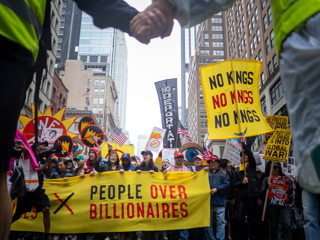June 2025
“The Slow Poison: How Democracy Withers and What We Can Do” draws chilling historical parallels between Nazi Germany's rise and current political trends in the U.S., particularly under MAGA influence. With stark comparisons and a breakdown of proposed legislation like the "One Big Beautiful Bill," this article warns that democracy doesn’t vanish in a moment—it erodes quietly, unless we speak up and take action.
Last updated 1 week ago
The Slow Poison: How Democracy Withers and What We Can Do
By Monica Granlove

The Nazi Grip on Germany: Cult Loyalty, Fear, and Control
Germany's slide into fascism in the early 1930s wasn't a sudden plunge; it was a slow, deliberate erosion. Adolf Hitler, never winning a majority vote, was appointed Chancellor in 1933. His ascension was the result of backroom political deals, orchestrated by elites who mistakenly believed they could control him. They were catastrophically wrong.
Once in power, Hitler masterfully exploited legal instruments to dismantle democracy from within. The infamous Reichstag Fire Decree and the Enabling Act, in particular, systematically suspended civil liberties and granted him near-total authority, suffocating German democracy.
The nightmare didn't begin with concentration camps. It began with pervasive propaganda, engineered fear, and the relentless demonization of opponents. While historical contexts are never identical, the chilling patterns that emerged then are alarmingly familiar today.
Government Comparison: Germany (1930s–1940s) vs. USA (Today)
| Nazi Regeme in Germany | MAGA-Era U.S. | |
|---|---|---|
| Marginalization of Groups | Systematically marginalized Jews, Roma, and others — stripping them of rights, leading to genocide. | Public figures frequently demonize immigrants (especially from Spanish-speaking countries) and other minorities, fostering an “us vs. them” mentality. |
| Control / Attack on the Press | Seized media, suppressed dissenting voices, and labeled journalists as "enemies of the state" to control public opinion. | Trump labeled the press "the enemy of the people," denied access to certain outlets (e.g., AP), and encouraged widespread distrust in independent journalism. |
| Rhetoric of Dehumanization | Called Jews and others "vermin" and "contaminants," preparing the public for widespread brutality. | Trump referred to immigrants as "vermin" and claimed they are “poisoning the blood of our country,” echoing dehumanizing fascist rhetoric. |
| Dismantling Democratic Norms | Used legal tools like the Reichstag Fire Decree and Enabling Act to suspend rights and seize authoritarian power. | After losing in 2020, Trump attempted to overturn results, suggested “terminating” parts of the Constitution, and has proposed purging civil servants loyal to democracy. |
| Imprisonment / Detention of Critics | Imprisoned dissenters and political enemies in prisons and camps, especially in occupied areas. | While not the same scale, ICE deported asylum seekers to dangerous regions. MAGA figures now promote using military force for deportation camps and prosecuting opponents. |
| Undermining Separation of Powers | Nazi leadership eliminated judicial independence and legislative oversight. Judges and lawmakers who resisted were dismissed, intimidated, or imprisoned, consolidating all authority under Hitler. | A judge was arrested by federal agents for actions taken in court. A sitting senator was detained and handcuffed at a DHS briefing. These incidents have sparked concerns about the executive branch using force to intimidate or override judicial and legislative independence. |
The Lesson: Democracy Doesn’t Die Overnight
Democracy rarely dies in a sudden coup. It erodes gradually — through unchecked power, fear-based politics, and public complacency. Hitler’s dictatorship didn’t start with death camps. It began with slogans, scapegoats, and silence from those who thought “it could never happen here.”
Many Americans now hear MAGA leaders promising “retribution,” floating ideas like one-day military trials, suggesting mass deportation operations, and suspending parts of the Constitution. These aren't fringe ideas anymore — they’re being cheered on major stages.
When the former president calls for terminating the Constitution and is met with applause instead of alarm, we are no longer talking about policy disagreements. We are talking about authoritarianism.
And today, we are faced with what Trump refers to as “One Big Beautiful Bill” (OBBB), now under debate in Congress. In my opinion, there is language in the bill that takes our country to authoritarian rule. Let’s look at those components below. What do you think?
Authoritarian-Style Provisions in OBBB
| Provision | What is is | Why It’s Authoritarian |
|---|---|---|
| Limiting Judicial Enforcement (Sec. 70302 / Sec. 80121(h)) | Requires plaintiffs to post a bond before courts can hold government officials in contempt for violating court orders. | Weakens judicial oversight and separation of powers—which are pillars of democracy—by allowing government actors to defy court orders with few consequences. Effectively shields officials from enforcement of judicial rulings |
| Broad State Preemption on AI | A 10-year federal ban preventing state or local governments from regulating AI, especially in elections. | Curtails local democratic control and consumer protections, consolidating power at the federal level and expanding executive or industry dominance. |
| Expansion of Executive Control over Social Programs | Tightens eligibility for Medicaid/SNAP, adds work requirements, and embeds ideological restrictions (e.g., abortion/gender care bans) . | Undermines federal social safety nets via top-down political ideology, reducing democratic choice and increasing centralized authority. |
| Micromanaging independent agencies | The bill includes measures allowing Congress and the President to determine, through legislation, how executive departments and agencies (e.g., Education, Energy) must operate effectively removing administrative autonomy. | This reduces the flexibility of agency leadership and binds them to political directives, and removes congressional oversight. |
| Expanded Use of Military for Domestic Enforcement | Vague enforcement clauses and increased budget authorizations allow for broader deployment of federal or military personnel in immigration raids, deportation efforts, and protest responses. | Blurs the line between military and civilian policing, which is dangerous for democracy. Increases potential for civil rights violations, protest suppression, and executive overreach in enforcing policy through intimidation or force. |
To fully evaluate the bill’s implications, here’s an overview of these troubling items:
- Judicial immunity from contempt → diminished separation of powers
- Federal preemption of AI laws → stifles local governance
- Expansion of deportation and detention → potential misuse
- Ideological control of federal aid → politicizes public services
- Educate yourself and others — about history, about current threats, and about the people most at risk.
- Call it what it is. Euphemisms protect dangerous ideas. This is authoritarian behavior in plain sight.
- Support a free press and resist disinformation.
- Vote in every election, especially local ones — where extremist ideas often take root.
- Speak up — online, in your community, at your dinner table. Call your state representative.

